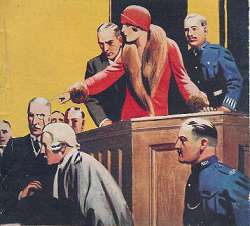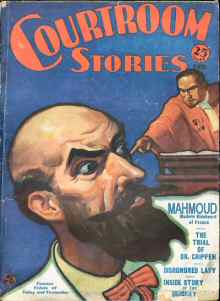 Omar Bakri Mohammed encouraged his small band of followers to turn their ideological zeal to violence, training them in boxing and urging them on, writes Duncan Gardham in the Telegraph report. It was at one such meeting that Omar Khyam, the leader of the fertiliser plotters, first came into contact with radical Islam as an impressionable teenager. It was Bakris boundless energy that drew together the various parts of the radical group he had founded, writes Gardham.
Omar Bakri Mohammed encouraged his small band of followers to turn their ideological zeal to violence, training them in boxing and urging them on, writes Duncan Gardham in the Telegraph report. It was at one such meeting that Omar Khyam, the leader of the fertiliser plotters, first came into contact with radical Islam as an impressionable teenager. It was Bakris boundless energy that drew together the various parts of the radical group he had founded, writes Gardham. Living on disability benefit in north London, Bakri drove round the UK encouraging members of radical group al-Muhajiroun. His radical ideology called for the establishment of a worldwide Muslim Caliphate and the black flag of Islam flying at No 10. Bakri helped organise a seminar after the September 11 attacks in favour of the Magnificent 19 and went on to call the July 7 bombers the Fantastic Four.
 In documents seen by The Daily Telegraph, al-Muhajiroun claimed: Terrorism is a part of Islam and Allah made it obligatory to prepare and to terrify the enemy of Allah. The article advised: The kuffar of USA and UK are without doubt our enemy. There is no such thing as an innocent kafir, innocence is only applicable for the Muslims. Not only is it obligatory to fight them, it is haram [forbidden] to feel sorry for them.
In documents seen by The Daily Telegraph, al-Muhajiroun claimed: Terrorism is a part of Islam and Allah made it obligatory to prepare and to terrify the enemy of Allah. The article advised: The kuffar of USA and UK are without doubt our enemy. There is no such thing as an innocent kafir, innocence is only applicable for the Muslims. Not only is it obligatory to fight them, it is haram [forbidden] to feel sorry for them.Al-Muhajiroun included several distinct groups the fertiliser plotters Omar Khyam and Waheed Mahmood became involved in Crawley, Anthony Garcia in east London and Salahuddin Amin in Luton. In Pakistan, after September 11, those groups came together under the guidance of Mohammed Babar, an al-Muhajiroun member from New York, and others, including allegedly Hassan Butt from Manchester, says the Telegraph report.
Babar and Butt allegedly set up an AM office in Lahore, with Butt said to have boasted of sending British recruits to fight allied forces in Afghanistan.
Another young man inspired by Bakri was Omar Sharif, from Derby, a student at Kings College London who went on to become a suicide bomber in Israel. Six months after the arrest of the fertiliser plotters in 2004, Bakri announced that he was closing down al-Muhajiroun but other organisations have been set up by his followers. The New York Police Department said last year it believed that al-Muhajiroun and its successors had connections with Islamic societies in 21 British towns and cities as well as student bodies, publishers and a software company. In a recent article in the London-based Arabic newspaper Al Sharq al-Awsat, a former leader of one group said: The students of Omar Bakri continue to preach on campuses.
Bakri now lives in the Lebanon and has been banned from returning to Britain, although his wife and seven children still live in London. In a sermon in English, given over a secure Internet site by Bakri last week, he talked of anti-terrorism arrests as a good sign. He said: When you put people under pressure everywhere, I think you are leading to explosion.

 Mohammed Junaid Babar, the al-Qaida supergrass (informer), gave a wealth of detail about a camp in Pakistan where fertiliser bomb cell members and the 7/7 bomber Mohammad Sidique Khan had weapons training. Babar has immunity from prosecution in Britain after pleading guilty to terrorism offences in a New York federal court. Two of the charges relate to the fertiliser bomb plot - he confessed to obtaining ammonium nitrate and aluminium powder for use in bomb-making.
Mohammed Junaid Babar, the al-Qaida supergrass (informer), gave a wealth of detail about a camp in Pakistan where fertiliser bomb cell members and the 7/7 bomber Mohammad Sidique Khan had weapons training. Babar has immunity from prosecution in Britain after pleading guilty to terrorism offences in a New York federal court. Two of the charges relate to the fertiliser bomb plot - he confessed to obtaining ammonium nitrate and aluminium powder for use in bomb-making. Five Britons were found guilty of plotting to carry out al-Qaeda-inspired bomb attacks across Britain potentially killing hundreds at targets ranging from nightclubs to trains and a shopping centre. The gang planned to use 600kg of ammonium nitrate fertiliser to make explosives to be used in bombings in revenge for Britain's support of the United States in the aftermath of the September 11, 2001 attacks, prosecutors said.
Five Britons were found guilty of plotting to carry out al-Qaeda-inspired bomb attacks across Britain potentially killing hundreds at targets ranging from nightclubs to trains and a shopping centre. The gang planned to use 600kg of ammonium nitrate fertiliser to make explosives to be used in bombings in revenge for Britain's support of the United States in the aftermath of the September 11, 2001 attacks, prosecutors said. The jury in the trial of seven men accused of plotting a bomb campaign in the UK has heard of a plan to hijack and crash a British Airways plane. The alleged plot was heard in a bugged conversation recorded by the security service, MI5, and played to jurors.
The jury in the trial of seven men accused of plotting a bomb campaign in the UK has heard of a plan to hijack and crash a British Airways plane. The alleged plot was heard in a bugged conversation recorded by the security service, MI5, and played to jurors.